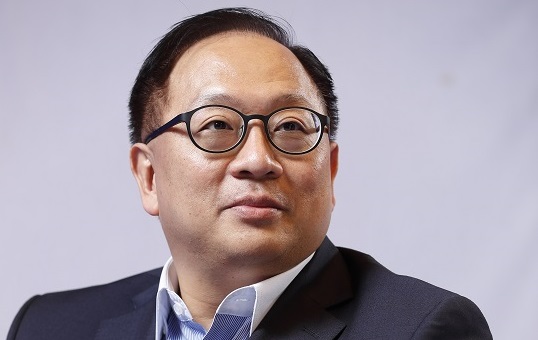
“The financial services industry is highly regulated with a risk-averse culture … Leaders in financial services need to be digital-savvy and make smart decisions on how to strike a balance between risk and innovation. They need to lead by example in order to transform their companies into a technology company with a financial service license.”
Dr Toa Charm has been a driving force for business innovation and progressive digital strategy for more than a quarter of a century. Today, as Chief Public Mission Officer (CPMO) for Hong Kong’s leading innovation hub, Cyberport, Charm is on a mission to transform innovative ideas into practicable – and profitable – business initiatives.
We spoke with Toa Charm about Cyberport’s efforts to inspire technological innovation across the financial services sector – from nascent start-ups to established financial services institutions – and the potential he sees in maturing technologies, such as big data and AI, to reshape the customer experience.
FST Media: How do you define ‘innovation’?
Charm: Innovation is a new idea that adds value to, or solves a problem for, a target person or a group of people. Nobody has yet thought of this idea or used it to solve a problem or add value to the target individuals’ experience.
FST Media: How does Cyberport seek to nurture innovation in the banking and financial services industry?
Charm: Cyberport was established as a fintech ecosystem in Hong Kong to nurture innovation in the banking and financial services sector. For instance, we inspire university students, fintech start-ups, financial services institutions (FSIs), and fintech regulators through forums, hackathons, competitions and training. Cyberport co-organises hackathons and competitions with FSIs and regulators to provide a platform for youth and start-ups to innovate and resolve real-world problems in the financial services industry. These programs also inspire innovation in participating financial services companies and regulators.
Cyberport has sent over 100 university students to Stanford University over the past two years to learn fintech and entrepreneurship, and will continue to do so this year. Cyberport has various programs to help youth transform their ideas into prototypes, nurture fintech start-ups through comprehensive incubation programs, and provide co-working spaces with value-added and relevant services for local and international fintech start-ups.
FST Media: What technology could prove the biggest ‘game changer’ in digital for the financial services sector?
Charm: Artificial Intelligence. It will redefine the game and significantly disrupt companies, practitioners and customers within the sector.
FST Media: What fintech initiatives stand out for you as particularly promising for the advancement of the financial services sector?
Charm: Enterprise collaboration with fintech start-ups is the turning point for the success of fintechs. Cyberport has taken the lead in creating a bridge between financial services institutions and start-ups. The Citi HK fintech Challenge and Hang Seng AI Hackathon are just some examples of this initiative; these programs deliver innovative solutions to help enterprises solve real-world problems, while start-ups have a chance to validate their innovations and leverage enterprises to expand their markets locally and globally.
FST Media: How well are banks and other financial services institutions leveraging big data and analytics to develop better business practices? Why?
Charm: Big data and analytics have been top priorities for FSIs. The question is who will do it better and faster. From risk management to precision marketing, financial services institutions are competing on big data analytics.
Data-driven culture, innovation culture, openness to and collaboration with external innovations, availability of external data, data privacy and security, and the availability of data scientists and tech-savvy business leaders, are some of the key stepping stones for the progress of big data applications in this sector.
FST Media: In what area are banks and other traditional financial services institutions struggling to innovate?
Charm: Financial services institutions have been putting a lot of effort and investment in technologies. However, not all these companies have the right data-driven, innovative and collaborative culture to make fintech innovations work.
The financial services industry is highly regulated with a risk-averse culture. Lots of IT investment is directed to security and risk management. Leaders in financial services institutions need to be digital-savvy and make smart decisions on how to strike a balance between risk and innovation. They need to lead by example in order to transform their companies into a technology company with a financial service license.
FST Media: Where do you predict big data innovation will be this time next year? Do you foresee a much bigger role for big data/analytics within the financial services sector?
Charm: Big data will become a necessity rather than an option for financial services institutions over the next year. Robo-advisers, ‘know your customer’ (KYC), Anti-Money Laundering (AML), cybersecurity, financing and credit scoring, the underwriting model of insurance policies, and supply chain financing have all become reliant on big data and AI. Making use of these well will bring unprecedented competitive advantages to FSIs, such as world-class customer experience, new revenue models, cost optimisation, risk mitigation, fraud detection, etc.
FST Media: How do you see developments in AI shaping data management and data visualisation?
Charm: Rather than visualising what the data tells us, AI can sense, learn and respond to target audiences. Customers will see a dynamic visualisation personalised to them based on their mood, location, time, events around them, etc. It will enhance the customer experience significantly. With the additions of virtual/augmented reality (VR/AR), IoT, wearables, and other latest technologies, the world will become a fascinating place.
FST Media: What would you like to see develop from IT innovation over the next five years?
Charm: I’d like to see a healthy and sustainable growth of the IT ecosystem. I’d like to see enterprises collaborate with digital technology start-ups; regulators listening to stakeholders and remaining open to innovation; young people finding passion to innovate and solve market pain points; governments providing the right policy and funding to innovations, and taking the lead in adopting innovative products; and universities nurturing the right talent for the market.
Cyberport is positioned as a global digital technology hub with over 900 digital technology companies in its community. We are determined to work with its global partners to establish a healthy and sustainable digital technology ecosystem for Hong Kong, Mainland China, Asia and the world.
FST Media: What is the best career advice you can give?
Charm: Lifetime learning is the key to succeeding in the digital economy. You need to know what you don’t know and work hard to master it. Don’t be afraid to take up new challenges; it may be difficult at the beginning of a project, but you will learn a lot in the process even if the project fails. Learn, review and move forward. I am doing it every day. Are you? ⚫





